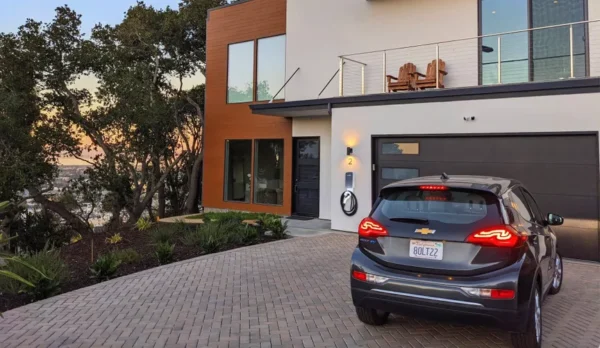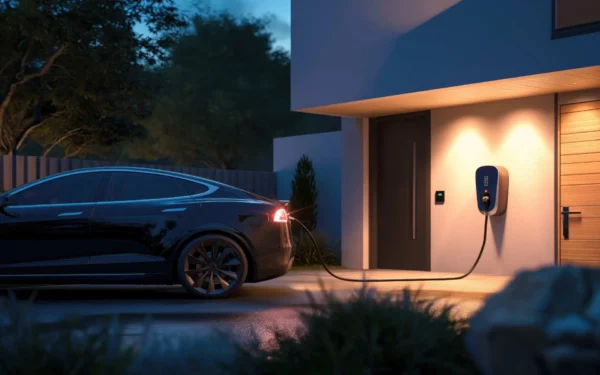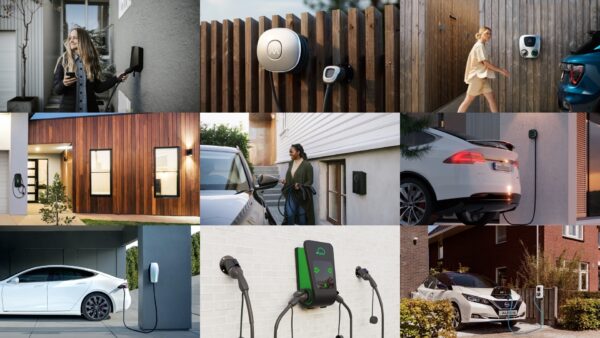
Do EV Chargers Increase Home Value? A Homeowner’s Guide to Electric Vehicle Trends
The rise of electric vehicles (EVs) is reshaping our world. It’s not just about the cars we drive, but also how we power them. Home EV chargers are becoming a common sight in driveways across the world. They offer convenience and cost savings for EV owners. But do they also increase home value?
This article explores the impact of EV chargers on property value. It delves into the current trends in the electric vehicle market. We’ll also look at the different types of EV chargers, their costs, and benefits. Whether you’re a homeowner, a prospective buyer, or just curious about EVs, this guide is for you. Let’s dive in.
The Rise of Electric Vehicles
Electric vehicles (EVs) are more than just a trend; they’re a revolution in transportation. As environmental concerns intensify, consumers are actively seeking greener choices. Governments worldwide are pushing for reduced emissions, and EVs are at the forefront of this movement. Canada is no exception to this shift. The country is seeing a growing number of electric vehicles on its roads. In response, infrastructure to support these vehicles, like charging stations, is expanding rapidly. This surge is supported by incentives from both federal and provincial governments. Manufacturers are responding to this demand with a wider array of electric vehicles. This includes everything from compact cars to luxury models. The variety ensures there’s an EV suitable for nearly every driver. The improved range and affordability make electric vehicles more accessible than ever.
As EV ownership increases, so does the need for efficient charging solutions. Home charging stations are becoming essential for electric vehicle owners. They provide the convenience of refueling your vehicle overnight. This ease of use is one reason why many homeowners are choosing to install EV chargers.
Impact on Home Value
The installation of an EV charger at home often raises a question: does it enhance the property’s value? Many real estate experts suggest it does. As electric vehicle adoption grows, so does the demand for homes equipped with EV chargers. Buyers increasingly consider the presence of a charger as a valuable home feature.

Properties with installed EV chargers appeal to eco-conscious buyers. These individuals value sustainable living options and are willing to pay a premium for them. This can significantly increase the marketability of a home. Installing a charger may not just be an investment in convenience but also in future resale potential. Moreover, a home with an EV charger can stand out in competitive housing markets. It reflects modernity and future-readiness, appealing to tech-savvy buyers. The trend signals a shift in how people view home features. While amenities like pools and granite countertops were once sought after, eco-friendly features are climbing the list.
EV chargers can also imply long-term savings for potential buyers. They provide a significant reduction in fuel costs compared to gasoline vehicles. Such savings could be a critical factor for budget-conscious buyers, enhancing the perceived value of the property.
Understanding EV Chargers

Types of EV Chargers
Electric vehicle chargers come in a variety of forms. EV home chargers are usually categorized into three levels: Level 1, Level 2, and Level 3. Each level offers different capabilities regarding speed and power. The best home ev charger depends entirely on your electrical needs. A level 1 electric car charger is the most basic option. They use a standard 120-volt outlet, much like common home appliances. While convenient, they charge slowly. Typically, they add around 3 to 5 miles of range per hour, which is sufficient for small commutes but not ideal for longer trips. Level 2 chargers offer a significant upgrade in performance. Operating at 240 volts, they can add about 25 to 30 miles of range per hour. This makes Level 2 EVSE charger much more suitable for daily use, ensuring the vehicle is fully charged overnight. The Level 3 EV charger, also known as DC fast chargers, are the powerhouses of the group. These chargers can replenish an EV battery to 80% in around 30 minutes. However, they require specific infrastructure and are not typically installed in homes. Level 3 Chargers are often used for commercial electric car charging stations. Commercial electric vehicle charging stations carry a larger demand for power output and quick charging for larger populations.
Understanding these types is crucial for homeowners considering the best EV charger for home installation. Each level has its pros and cons, influencing which is the best EVSE charger that’s suited for a particular lifestyle. For many, the choice often comes down to balancing cost with charging speed. The best electric vehicle charger for an individual depends entirely on their lifestyle and goals.
Benefits of the Best Level 2 Charger
Investing in a Level 2 Charging Station offers various advantages. The primary benefit is its optimal charging speed. It bridges the gap between the slower Level 1 and costly Level 3 chargers, providing a sweet spot for daily use. With level 2 electric car charging stations, your electric vehicle benefits by gaining a substantial range overnight. This allows EV owners to start each day with a full battery, ready for long commutes or unforeseen errands. The convenience of faster charging at home cannot be overstated. Moreover, a level 2 EVSE charger can handle a broad range of electric vehicles. This flexibility makes them a practical choice for households with more than one type of EV. Additionally, the relatively accessible installation process adds to their appeal. Making them the ideal electric car charger for home use. A Level 2 EV charger price being substantially lower than, say, a Level 3 Charger.
When would you Install a Level 3 EV Charger?
A level 3 electric car charger, while not commonly installed in residential settings, can be a valuable addition for homeowners with high EV usage or those who frequently host guests with electric vehicles. Having a Level 3 charger at home can provide rapid charging capabilities, allowing vehicles to recharge significantly faster than Level 1 or Level 2 options. However, the installation of a Level 3 charger requires a substantial electrical infrastructure upgrade, which can be costly and complex. Homeowners should carefully evaluate their charging needs and consider whether the convenience of fast charging justifies the investment. For those who prioritize quick turnaround times for their vehicles, a Level 3 charger could enhance the property’s appeal, particularly in areas with a high concentration of electric vehicle owners. Although typically this type would be most appropriate as a commercial EV charging station.
Charging Station Options

Homeowners interested in EV Car Chargers have various options. They range from simple plug-in models to more complex, hardwired systems. Each option has distinct features worth considering based on individual needs. There are several leading electric car charging station companies to choose from when selecting top rated ev chargers for your home. Tesla charging stations in Toronto being especially sought after. Electric car charging station prices may vary depending on the types and brands that homeowners may select. Each brand has their pros and cons. For instance, when comparing a Borne EVduty vs Flo home car charging point, buyers must consider their reliability and desirability in the EV Car Charger space.
Plug-in chargers are relatively easy to install. They simply connect to a 240-volt outlet. This type is often portable and can be unplugged and moved as needed. It offers flexibility for those who might relocate or adjust their charging setup.
Hardwired models, however, are more permanent. These chargers provide a cleaner installation without exposed cables. This installation type often supports more advanced features, making it ideal for those committed to long-term EV ownership.
Another crucial consideration is whether the charger will be used indoors or outdoors. Outdoor installations should be weatherproof and robust to withstand the elements. Indoor units don’t need the same level of protection.
Smart chargers bring additional benefits. These models connect to Wi-Fi, allowing for remote monitoring and control via a smartphone app. They enable users to schedule charging times, potentially reducing costs by charging during off-peak hours.
Finally, aesthetic and space considerations play a role. Compact chargers can fit into tighter spaces, preserving garage functionality. Meanwhile, sleek designs might complement a home’s existing décor, blending technology with style.
Ultimately, the choice depends on individual preferences, existing infrastructure, and budget constraints. Evaluating these factors will help in selecting the best EV charging station for your home.
The Case for EV Chargers Increasing Home Value Attracting Eco-Conscious Buyers
As electric vehicles grow in popularity, so does the demand for sustainable living options. Eco-conscious buyers are now looking for homes equipped with environmentally friendly features, such as EV chargers. Installing an EV charger can thus broaden the appeal of a property to these buyers. Having electric vehicles available in Canada has drastically changed changed modern society in our country. This demographic often prioritizes sustainability and technology integration when purchasing homes. An EV charger presents a forward-thinking commitment to reducing carbon footprints. It becomes a key selling point, emphasizing the home’s readiness for green living. Moreover, properties with EV chargers appeal to tech-savvy individuals. These buyers appreciate modern solutions that enhance convenience and efficiency. As awareness of environmental issues continues to rise, homes with the best EV car charger stations will likely become increasingly sought after. A safe choice for electric car charging stations Toronto home owners can count on may include Tesla Superchargers. Considering Tesla has a network of Superchargers, some of which are also accessible to other EVs with the “Magic Dock” adapter.
Enhancing Home Marketability
An EV charger can make a home stand out in a competitive real estate market. By adding this modern amenity, sellers position their properties as forward-thinking and eco-friendly. This distinction can capture buyers’ attention and tip the scales in a crowded market.
Homes with EV chargers are often viewed as future-proof investments. They alleviate one concern potential EV owners might have: finding a convenient charging solution. This added value can enhance the overall perceived worth of the property.
Furthermore, having an EV charger installed can simplify the buying process. Buyers don’t have to worry about installation logistics or immediate costs. This ready-to-use feature can provide peace of mind, offering a turnkey solution that enhances home marketability.
Comparison to Traditional Home Features
Traditional home features like updated kitchens and modern bathrooms have long been crucial selling points. However, as lifestyles evolve, new amenities take center stage. An EV charger stands as the next-generation feature that adds substantial value. Unlike cosmetic updates, electric car home charging stations offer a specific lifestyle need. It aligns with current trends toward sustainable living and energy efficiency. In this way, it offers something unique that traditional features may not provide.
Adding an EV charger can also signify a deeper investment in home infrastructure. It reflects a preparedness for future technological advances, similar to installing smart home systems. Comparatively, it’s a feature that echoes the modernization pathways seen in high-tech homes.
While traditional elements still matter, an EV charger shifts the focus to a more holistic lifestyle upgrade. In doing so, it complements other modern conveniences and reassures buyers of a home’s relevance in a changing world.
Cost Considerations
Installation Costs of EV Chargers
How much does an ev charging station cost? The total expense depends on factors like the type of charger and the complexity of installation. Level 2 ev car chargers, for example, typically costs more than a Level 1 charger but offers faster charging times.
On average, the price of electric car charging station installation can range from a few hundred to a few thousand dollars. Level 2 EV charging stations are popular for home use, balancing cost with efficiency. They usually require professional installation by a certified electrician, which adds to the expense.
Additional costs may arise from upgrades to electrical panels or permits required for installation. Homeowners should consider these potential extras when budgeting. Obtaining quotes from different electric car charger suppliers can help in selecting a suitable option.
Incentives and rebates from governments may help offset some of the electric vehicle charging station cost. These financial aids can significantly reduce the out-of-pocket expense for homeowners. Research into available incentives is a prudent step before proceeding with installation.
Electric car charging station prices vary depending on your needs. While a Level 3 charger for home use is rare due to high power requirements, considering future technology advancements is wise. Homeowners should assess their current and future EV charging needs when choosing a charger type.
Overall, cost for electric car charging station installation can vary widely based on several factors. Understanding the full scope of costs ensures homeowners are well-prepared financially. A well-planned installation can enhance property value and convenience for electric vehicle owners.
Long-Term Savings on Utility Bills
Electric Car vs Gasoline Car Cost
Switching to an electric vehicle can lead to substantial savings on utility bills over time. Compared to gasoline vehicles, electric cars often have lower fuel costs. Charging an EV at home is usually cheaper than refueling a traditional car.
Electricity rates tend to be more stable than gasoline prices. This stability can provide more predictable transportation costs. Many utility companies offer special rates for EV charging, which can further enhance savings.
Installing ev home charging stations allows for convenient overnight charging. Off-peak electricity rates can reduce costs significantly when charging during these periods. Homeowners can schedule charging to maximize these savings.
Moreover, efficient energy use through smart chargers can optimize electricity consumption. These chargers adjust charging based on electricity demand and cost, providing more savings opportunities. Homeowners with solar panels can benefit even further by utilizing renewable energy for charging.
Long-term, these savings on utility bills can offset the initial installation costs of car chargers for electric cars. The financial benefits, combined with the environmental perks, make EVs an appealing choice. Investing in a home EV charger can thus offer substantial economic benefits over time.
By reducing dependence on gasoline, electric vehicle owners can improve their financial outlook. The ongoing transition to electric vehicles promises further enhancements in efficiency and cost savings. Homeowners who invest in this technology today stand to benefit well into the future. The best home charging station perks are seen from the savings homeowners will see after long term usage.
Final Thoughts on Home Value and EV Chargers
Incorporating an EV charger can enhance a home’s appeal, especially for eco-conscious buyers. It offers convenience and positions the property as forward-thinking. As electric vehicles gain popularity, homes equipped with charging stations may see increased marketability and value. The initial investment in installation can provide returns through resale value and utility savings. For homeowners, this addition aligns with both practical and financial benefits.
The Future of EVs and Real Estate Trends
The demand for electric vehicles is set to continue rising, influencing real estate trends significantly. Homes with EV charging facilities will likely become a standard, not a luxury. This shift means properties already equipped with chargers may stand out in competitive markets. As technology evolves, so will expectations for home amenities, making EV chargers a wise investment. By future-proofing homes with this technology, homeowners can stay ahead in a changing landscape. Consider booking an EV Charger Installation Service call with a Licensed Electrical Contractor Today!












































